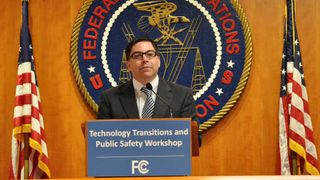FCC's O'Rielly Praises SPEED Act

Republican FCC Commissioner Michael O'Rielly is all for a new bill to speed the deployment of broadband, but also says it highlights why FCC action is needed.
That came in a statement Monday (Oct. 23) on a bipartisan bill introduced last week by Sens. Roger Wicker (R-Miss.) and Catherine Cortez Masto (D-Nev.) that would streamline the deployment of broadband infrastructure in areas that had already been "subjected" to historical or environmental reviews.
The idea is to speed rights-of-way grants and avoid duplicative reviews to pave the way for next-gen broadband, like 5G, say the sponsors of the appropriately named Streamlining Permitting to Enable Efficient Deployment of Broadband Infrastructure Act of 2017 (SPEED Act), S. 1988.
“I applaud Senators Wicker and Cortez Masto for introducing the SPEED Act," said O'Rielly. "This bipartisan effort to ease and accelerate the deployment of broadband technology would put an end to some of the excessive delays industry experiences when siting facilities." But he added: "While this is a helpful first step, it reaffirms my belief that preemption is necessary to prevent unnecessary and costly barriers to small cell deployment.”
In its own efforts to speed deployment, the FCC has asked for input on improving/speeding local and state tower citing processes and reviewing the impact of environmental and historic preservation studies on buildouts. It is proposing to deem an approval granted if a locality fails to act by a deadline, rather than having to resort to legal remedies to force a decision. It also wants input on the length of a shot clock on deciding a cell site application by localities. The FCC also proposes banning state or local moratoria.
"I have also met with many people about the delays and expense of seeking the necessary local permitting and tribal approvals," O'Rielly said last April when the FCC proposed its own speeding of approvals. "This has been especially problematic for small cell systems, which should not require the same review and fees as a macro tower. Many localities and tribes are, undoubtedly, acting in good faith, and I thank them for their cooperation in approving the deployments necessary to provide Americans with the wireless services they demand, but bad actors are ruining it for everyone. Infrastructure siting is not a means to increase revenues; and delaying application reviews, imposing de facto moratoria, preventing densification and upgrades of networks, among other tactics, is not acceptable."
Broadcasting & Cable Newsletter
The smarter way to stay on top of broadcasting and cable industry. Sign up below
Contributing editor John Eggerton has been an editor and/or writer on media regulation, legislation and policy for over four decades, including covering the FCC, FTC, Congress, the major media trade associations, and the federal courts. In addition to Multichannel News and Broadcasting + Cable, his work has appeared in Radio World, TV Technology, TV Fax, This Week in Consumer Electronics, Variety and the Encyclopedia Britannica.

